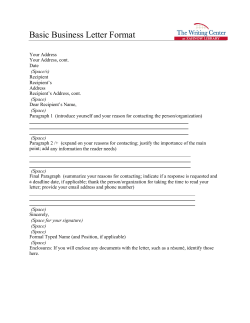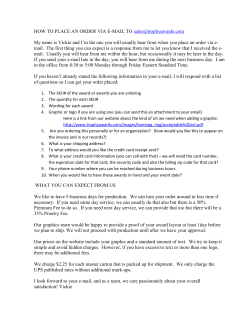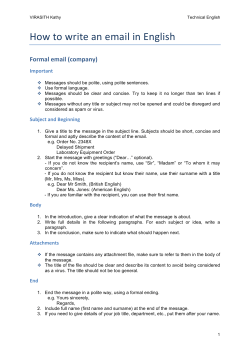
Document 230745
4/24/13 Making the Subaward Process Easier from Start to Finish TRISHA SOUTHERGILL, CLEMSON UNIVERSITY DIRECTOR GRANT SUPPORT SERVICES PAMELA WATSON, VANDERBILT UNIVERSITY CONTRACT COORDINATOR OFFICE OF CONTRACTS & RESEARCH ADMIN Objectives of the Session Define basic subaward terms Walk through the subaward process (pre-award, award, and post award) Identify troublesome areas and provide tips to avoid/mitigate problems. What is a Subaward? According to the OMB Circular A-110, a Subaward is defined as “an award of financial assistance in the form of money, or property in lieu of money, made under an award by a recipient to an eligible subrecipient or by a subrecipient to a lower tier subrecipient.” The subrecipient carries out a portion of the programmatic effort of the project ¡ The subrecipient must adhere to sponsored compliance requirements (IRB, IACUC, rebudget restrictions, publication rules, Intellectual Property rights) ¡ 1 4/24/13 Other Important Terms Prime Award / Prime Grant / Prime Contract Prime Recipient (aka Pass Through Entity) Subrecipient / Subgrantee / Subawardee / Subcontractor Subaward / Subgrant / Subcontract Vendor Consultant Scope of Work (SOW) Subaward Budget Invoice Progress Reports Financial Reports Purchased Service/ Vendor vs. Consultant (i.e. NOT subawards) Vendor ¡ an organization providing goods or services that are necessary for conducting a program. Consultant ¡ an expert advisor who is paid for his/her time at a fixed rate of compensation (hourly or daily and includes travel, expenses and overhead) specified in the consultant agreement Is the Sub a Vendor? Questions to ask before including a subaward in a proposal: 1. 2. 3. 4. 5. Does the entity commonly provide these goods and/or services as part of their normal business operations? Does the entity provide similar goods and/or services to other purchasers? Does the entity compete with comparable entities to provide the same goods and/or services? Are the goods and services being provided by the entity secondary to the central purpose of the project? Is the entity’s work carried out according to the Prime’s specifications using standard operating procedures? Yes to any? ÷ VENDOR 2 4/24/13 Benefits of a Subaward Collaboration ¡ Offers extension of researcher networks ¡ Allows research to be conducted at disparate locations ¡ Allows effective utilization of individual talents (subbing out work to specialists) ¡ Provides more research opportunities (subset of RFPs require collaboration) ¡ Provides opportunity for greater validity of project by including more experienced investigators See examples at NORDP (National Organization of Research Development Professionals site. http://www.nordp.org/funding-opportunities The Process- Pre-Award Research Administrator: ¡ Coordinate collection of proposal information (as per Sponsor proposal guidelines) ÷ subawardee information budget ¢ budget narrative ¢ SOW ¢ and official letter of collaboration ¢ PI: ¡ ¡ Collaborate with subrecipients on technical portions of proposal Coordinate with Research Administrator to get this information from recipient institution. The Process- Pre-Award Proposal Office (Institutional Official): ¡ Review proposal for completeness ¡ Facilitate collection of documents as needed ¡ Submit proposal to Sponsor 3 4/24/13 The Process – Award Stage Once the prime award is received (or the contract is executed), the PI and Administrator send a request to the Contracts office to issue a new subaward. At this point, the Contracts office will initiate their process: The Process- Award Stage Prepare initial draft for negotiation Route to PI and Departmental Admin for approval Send draft to subrecipient Negotiate any unacceptable terms Receive partially executed copy from subrecipient Sign Contract and return Fully Executed Copy The Process- Post Award Financial Management ¡ Set up subaward in financial system (Encumber/draw down funds) ¡ Process invoices and make payments to subrecipients ¡ Monitor financial reports Closeout ¡ Verify status of final invoice ¡ Make final payments/adjustments ¡ Ensure receipt of required reports ¡ Prepare closeout reports to prime sponsor 4 4/24/13 Additional Responsibilities – Prime Recipient Principal Investigator ¡ Majority of proposal work plus coordination of elements from subs ÷ Collect subrecipient budget, scope of work, and other documentation Communicating with each subrecipient PI to monitor work progress ¡ Reviewing and approving invoices for appropriateness and compliance with Sponsor rules ¡ Coordinating with subrecipients to collect required progress reports to include with required reports to Sponsor ¡ Additional Responsibilities – Prime Recipient PI’s Departmental Administrator ¡ Helping PI with administrative management of all subrecipients (so all the tasks on the previous slide and then…) ¡ Coordinating with central office (Contracts and Accounting) ¡ Coordinating with subrecipient administrators Additional Responsibilities – Prime Recipient Prime Recipient Additional Responsibilities: Pre-award Office ¡ Coordinate application info for accuracy and completion. ÷ General items required: of collaboration/commitment ¢ Budget ¢ Budget narrative ¢ Scope of work ¢ Cost share documentation (if applicable) ¢ Any other items required by sponsor (CV, COI, CP, etc.) ¢ Letter Prime Recipient submits full package to Sponsor 5 4/24/13 Additional Responsibilities – Prime Recipient Central Award / Contract Office ¡ Verify award details, review terms and conditions ¡ Verify that subaward is approved by prime sponsor ÷ If ÷ If ¡ ¡ not approved, seek approval for subaward the subawardee is foreign, seek additional approval regardless Collect subawardee information (required for reporting) Verify that PI/Admin has sent: ÷ Scope of work ÷ Budget Draft agreement Negotiate with subrecipient ¡ Have agreement signed by authorized official ¡ ¡ Additional Responsibilities – Prime Recipient Post Award Office ¡ ¡ ¡ Monitoring: OMB Compliance issues, A-133 audit compliance, financial and technical Financial compliance: track sub recipient allocations separately Process for review and approval of invoices ÷ Research Admin: financial Reimbursement for disallowances Verify cost share commitments ÷ PI: programmatic ¢ Scientific process ¢ Inventions report ¢ Timely submission of deliverables ¢ Final reports ¢ ¢ Selecting a Subawardee What will my subrecipient be responsible for? ¡ Performing their portion of the work, (detailed in their “scope of work”) ¡ Ensuring that their expenditures follow the prime sponsor guidelines (allocable, allowable, reasonable, and consistent) ¡ Managing the funds in an acceptable accounting system that allows for tracking funds in separate cost accounts ¡ Submitting invoices, progress reports, and other required documentation 6 4/24/13 Selecting a Subawardee What should I be aware of about my potential collaborator’s institution? ¡ ¡ Reputation Previous negative experiences with the institution What information do I need from my subrecipient for my proposal? Letter of commitment (signed by institutional official) Budget ¡ Scope of work ¡ ¡ Difficult Subawards What makes collaboration “risky” for the prime institution (or the subrecipient institution)? ¡ Audit findings (or no annual audit) ¡ Poor performance on either institution’s part ÷ Findings related to similar work or financial management ÷ Failure to perform work or poor communication to submit required documentation timely (progress reports, financial reports, invoices, etc.) ÷ Failure ¡ Prime grant or contract includes restrictions ÷ NASA grants exclude collaboration with China (this includes Chinese graduate students at subrecipient institution) Difficult Subawards Some standard risk assessment factors: • Foreign subrecipient • • Subrecipient Maturity • • Award Type / Sponsor Type • • Amount of subaward • Percentage of subaward • • Accounting system established • • Procurement systems approved • Negotiated indirect rates • • Audit findings • ITAR/EAR type of work • Intellectual Property (IP) Issues Human/Animal • subjects Potential for Conflict of Interest Scope of Work (abstract deliverables) / Deliverables required for prime work Poor documentation Subrecipient cost share Subrecipient does not have financial COI policy (PHS/NSF) Subrecipient does not have RCR program 7 4/24/13 Difficult Subawards What makes contracts “risky” for the prime institution (or the subrecipient institution)? ¡ Difficult terms ÷ Publication restrictions clauses ÷ Short turn-around time for financial reports ÷ Indemnification Difficult Subawards What will the contracts office do if the subrecipient is deemed medium to high risk? ¡ ¡ Very rare to refuse to issue subaward/subcontract Contracts office will modify template to mitigate risk ÷ Fixed price agreement stringent reporting requirements ÷ On site visits ÷ Desk audits ÷ More Improving the Experience Pre-Award: ¡ Better collaboration between institutions ¡ Clear list of information communicated between institutions ¡ Files emails with appropriate file names and types ¡ Other Ideas? 8 4/24/13 Improving the Experience Award Stage ¡ Make sure requests to central office include all necessary information ¡ Communicate with your Central office (early and often) ¡ Speaking of early, make requests timely Improving the Experience Post Award/Financial Management ¡ Monitor expenses and performance ¡ Pay attention to invoice review ¡ Insist on good documentation ÷ Ask questions if documentation or explanations seem thin Good management helps spot problems early – which allows you to address problems quickly! Different Experiences/ Processes We would love to hear about your processes. What do you do differently? Ideas for improvement? 9 4/24/13 Questions? Contact Us! Trisha Priester Southergill PRIEST2@clemson.edu Pamela Watson Pamela.watson@vanderbilt.edu 10
© Copyright 2025














